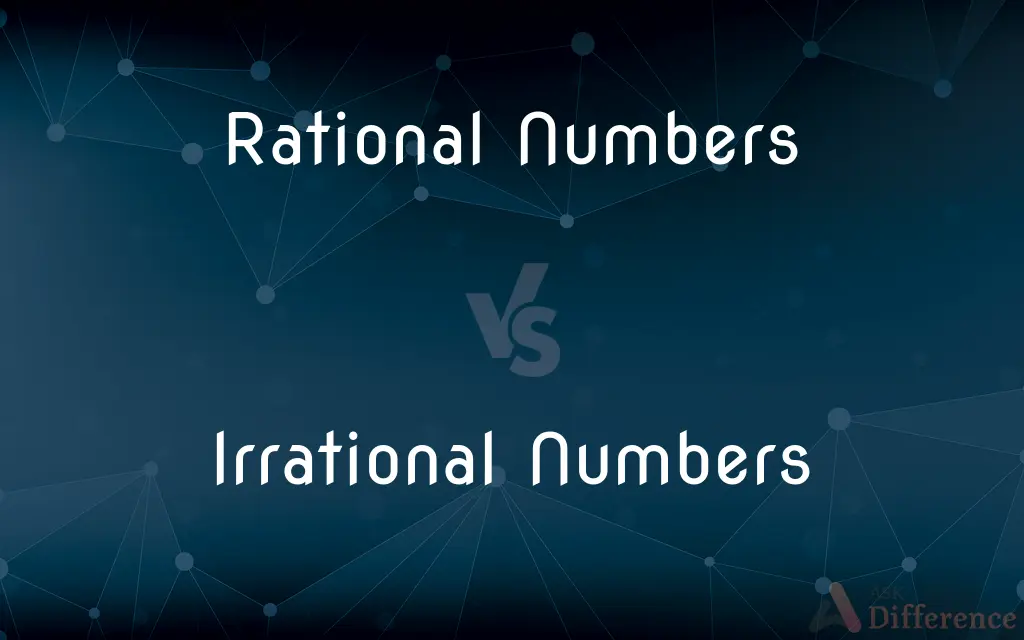Rational Numbers vs. Irrational Numbers — What's the Difference?
Edited by Tayyaba Rehman — By Fiza Rafique — Published on December 16, 2023
Rational Numbers can be expressed as a fraction; Irrational Numbers cannot be expressed as exact fractions.

Difference Between Rational Numbers and Irrational Numbers
Table of Contents
ADVERTISEMENT
Key Differences
Rational Numbers are those numbers which can be written in the form of a fraction, where both the numerator and the denominator are integers and the denominator is not zero. This means any number that can be expressed as a ratio of two integers falls under Rational Numbers.
On the other hand, Irrational Numbers are numbers that cannot be written as a simple fraction. They do not have an exact fractional representation. Rational Numbers include integers, whole numbers, and fractions. For instance, 2, -5, 3/4, and 0 are all examples of Rational Numbers.
Conversely, Irrational Numbers include numbers like the square root of a non-perfect square, π (pi), and e (the base of natural logarithms). The decimal representation of Rational Numbers either terminates or repeats. For example, 0.5 or 0.333... (repeating) are Rational Numbers.
However, the decimal representation of Irrational Numbers neither terminates nor repeats. An example is the value of π, which starts 3.14159 and continues indefinitely without a pattern.
Comparison Chart
Representation
Can be expressed as a fraction
Cannot be expressed as exact fractions
ADVERTISEMENT
Decimal Form
Terminates or repeats
Neither terminates nor repeats
Examples
Integers, fractions
Square roots of non-perfect squares, π, e
Pattern in Decimals
Has a pattern or ends
Continues indefinitely without a pattern
Inclusion in Real Numbers
Subset of real numbers
Subset of real numbers
Compare with Definitions
Rational Numbers
Rational Numbers have a finite or repeating decimal expansion.
1.666... (repeating) is a representation of the Rational Number 5/3.
Irrational Numbers
Irrational Numbers cannot be expressed as a simple fraction.
The square root of 2 is an Irrational Number.
Rational Numbers
Rational Numbers have decimal representations that either terminate or repeat.
0.25 is a Rational Number since its decimal terminates.
Irrational Numbers
Irrational Numbers lack a precise fractional representation.
The number e, which is approximately 2.71828, is an Irrational Number.
Rational Numbers
Rational Numbers include whole numbers, fractions, and integers.
7 is a Rational Number because it can be expressed as 7/1.
Irrational Numbers
Irrational Numbers are real numbers that are not rational.
The golden ratio, often represented by φ, is an Irrational Number.
Rational Numbers
Rational Numbers can be written as a ratio of two integers.
For example, 4/5 is a Rational Number.
Irrational Numbers
Irrational Numbers have non-repeating, non-terminating decimals.
π, approximately 3.14159..., is an Irrational Number.
Rational Numbers
Rational Numbers are a subset of real numbers.
-2 is a Rational Number as it's an integer and part of the real number set.
Irrational Numbers
Irrational Numbers include roots of non-perfect squares.
The square root of 7 is an Irrational Number as it doesn't yield a whole number.
Common Curiosities
Is every fraction a Rational Number?
Yes, every fraction with an integer numerator and a non-zero integer denominator is a Rational Number.
Do Irrational Numbers ever repeat in their decimal form?
No, the decimal form of Irrational Numbers neither terminates nor repeats.
What are Irrational Numbers?
Irrational Numbers are numbers that cannot be written as a simple fraction.
Can Rational Numbers have decimals?
Yes, Rational Numbers can have decimals that either terminate or repeat.
Can the square root of any number be Irrational?
The square root of non-perfect square numbers is Irrational.
What are Rational Numbers?
Rational Numbers are numbers that can be expressed as a fraction of two integers.
Are all integers considered Rational Numbers?
Yes, all integers can be considered Rational Numbers since they can be written as a fraction with a denominator of 1.
Are numbers like 1.5 considered Rational or Irrational?
Numbers like 1.5 are Rational because they can be expressed as a fraction, in this case, 3/2.
Is π (pi) a Rational or an Irrational Number?
π (pi) is an Irrational Number.
Are Rational and Irrational Numbers both part of the real number system?
Yes, both Rational Numbers and Irrational Numbers are subsets of the real number system.
What makes a number Rational?
A number is Rational if it can be expressed as a fraction where both the numerator and denominator are integers, and the denominator is not zero.
Are Rational Numbers finite?
The decimal representation of Rational Numbers is either finite or repeating.
Can Irrational Numbers be approximated as fractions?
Yes, Irrational Numbers can be approximated by fractions, but they won't have an exact fractional representation.
What's an example of a number that's neither Rational nor Irrational?
Complex numbers, which have imaginary parts, are neither Rational nor Irrational.
How can you determine if a decimal is Irrational?
If its decimal expansion neither terminates nor repeats, it is Irrational.
Share Your Discovery

Previous Comparison
Chordates vs. Protochordates
Next Comparison
Overdraft vs. Demand DraftAuthor Spotlight
Written by
Fiza RafiqueFiza Rafique is a skilled content writer at AskDifference.com, where she meticulously refines and enhances written pieces. Drawing from her vast editorial expertise, Fiza ensures clarity, accuracy, and precision in every article. Passionate about language, she continually seeks to elevate the quality of content for readers worldwide.
Edited by
Tayyaba RehmanTayyaba Rehman is a distinguished writer, currently serving as a primary contributor to askdifference.com. As a researcher in semantics and etymology, Tayyaba's passion for the complexity of languages and their distinctions has found a perfect home on the platform. Tayyaba delves into the intricacies of language, distinguishing between commonly confused words and phrases, thereby providing clarity for readers worldwide.













































